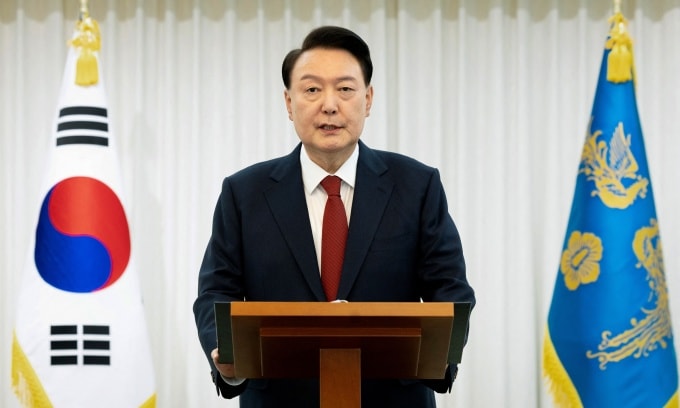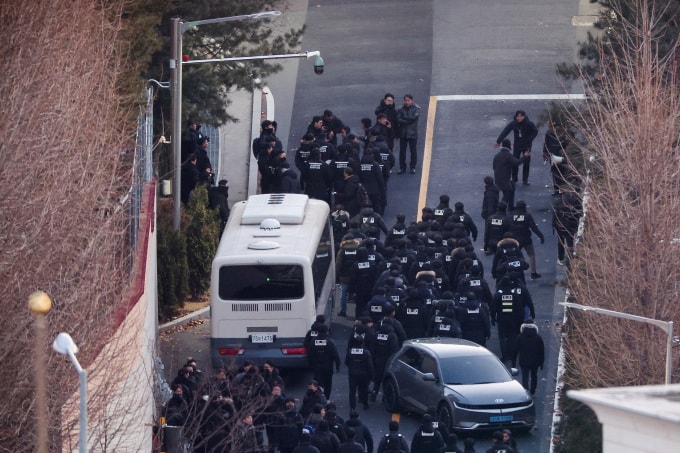The successful execution of the arrest warrant gives South Korean prosecutors 48 hours to question President Yoon Suk-yeol on charges of rebellion, before making their next move.

President Yoon Suk-yeol was arrested at his residence in Seoul on the morning of January 15 and taken to the Corruption Investigation Office (CIO) for questioning. Yoon became the first South Korean president to be arrested while in office.
This is the second time the CIO and the police have executed an arrest warrant against Mr. Yoon after the first attempt on January 3 failed. The CIO is determined to execute the arrest warrant to the end to protect the reputation of this young investigative agency, as well as to prevent the risk of chaos in the political arena if the stalemate continues.
Meanwhile, President Yoon said he decided to surrender to the CIO to avoid the risk of "unnecessary bloodshed" between his bodyguards and the police. However, he still considered the CIO's investigation "invalid and worthless".
The investigation team has 48 hours to question Mr. Yoon at the CIO headquarters. Investigators said they have more than 200 pages of questions for the President related to the decision to declare martial law on December 3, 2024.
Deputy CIO Director Lee Jae-seung was the one who directly questioned President Yoon. However, during Lee's first questioning sessions, President Yoon did not answer any questions.
Mr. Yoon was then detained at the Seoul Detention Center in Uiwang, Gyeonggi Province, about 16 kilometers from his residence. When Mr. Yoon was transferred there, the Seoul Detention Center was considered a protected area under the Presidential Security Act.
Article 5 of the Act allows the Presidential Security Service (PSS) to conduct inspections of the facility to ensure safety, effectively placing the area under their control.
After 48 hours of questioning, the CIO will have to decide whether to release President Yoon or continue to detain him for investigation. If they want to detain the President longer and have grounds to believe he committed a crime, they will need to apply for a further arrest warrant, allowing them to hold him for 20 days.

If not, Mr. Yoon will be released on the morning of January 17. Legal experts say it is highly likely that the CIO will request a 20-day detention order for Mr. Yoon to continue the investigation.
Mr Yoon is facing multiple criminal investigations on charges of rebellion, following the imposition of martial law in early December last year. He is currently banned from leaving the country and has been suspended from power, although he remains president.
Justin McCurry, analystGuardiansaid the charges against Mr. Yoon were serious. Inciting rebellion is one of the few crimes for which the South Korean president does not enjoy immunity. If convicted, he could face severe punishments such as life imprisonment or even the death penalty.
Mr. Yoon's arrest is directly related to the move to declare martial law, but the criminal investigation into the sedition charges is separate from the impeachment process against the president.
While he is being questioned by the CIO as part of the investigation, the Constitutional Court of South Korea is holding hearings to decide whether to approve or reject the impeachment resolution of President Yoon, which was passed by the National Assembly in mid-December. The court has 180 days to make a decision from the date of acceptance of the case on December 14, 2024.
Under the South Korean Constitution, a presidential impeachment resolution can only be approved if at least six of the nine justices agree. But currently, the court has only eight justices, with one vacancy yet to be filled. Analysts do not expect the eight sitting justices to make a decision quickly, given the severity of the political crisis that has engulfed South Korea for the past five weeks.
The first hearing on Yoon’s impeachment was held on January 14 but lasted only four minutes as the president refused to attend. The Constitutional Court is scheduled to hold five more hearings until early February, but it is unclear whether Yoon will attend.
If the Constitutional Court upholds the impeachment, Mr. Yoon will be removed from office, becoming the shortest-serving president in the history of South Korea's democracy. This will also pave the way for his trial and conviction, while South Korea holds a new presidential election within 60 days. If the court rejects the impeachment, he will be reinstated, but will continue to be investigated by the CIO.
The impeachment process and criminal investigation against Mr Yoon will continue in the coming weeks and months, but observers say it is difficult to predict how things will end at this point.
"Mr. Yoon could face trial for sedition, but be reinstated by the Constitutional Court. In the worst case, he could face both a criminal trial for sedition and removal from office by the Constitutional Court, with no immunity whatsoever," McCurry said.
VN (according to VnExpress)